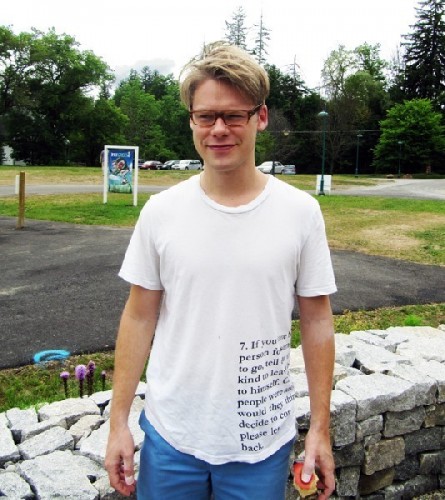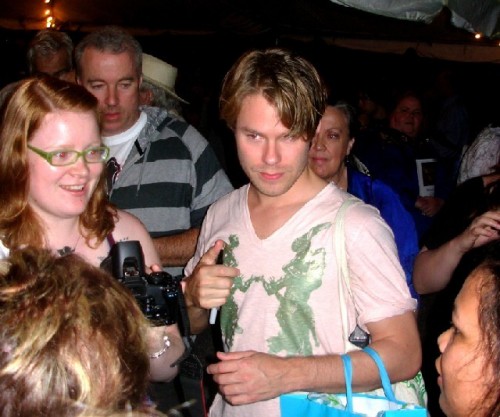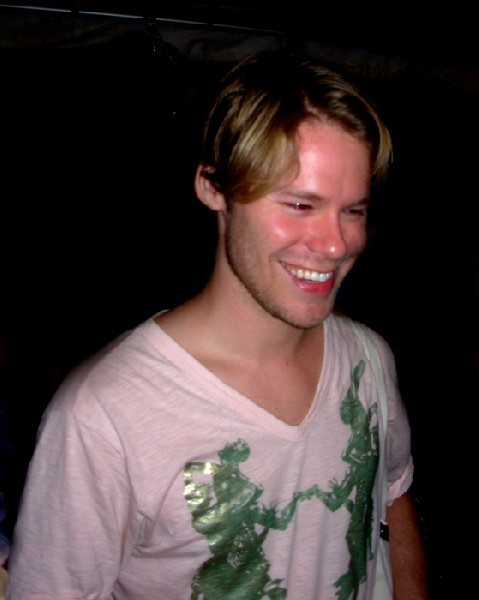Randy Harrison Talks About Tommy
Enjoying His Sixth Season with Berkshire Theatre Festival
By: Charles Giuliano - Jul 14, 2011
Charles Giuliano Good morning, great to speak with you, and greetings from our friend John Douglas Thompson. He regrets that because of the short run he will not get to see you in Tommy.
Randy Harrison It’s such a short run a lot of people are missing it unfortunately.
CG Why such a short run? Was there anything in your schedule that was a factor?
RH My guess is, because it is twice the size of the Main Stage at Berkshire Theatre Festival, they weren’t sure of what selling it would be like. They were cautious. That’s my total guess. I’m just guessing.
CG Did you have other work pending that locked you in?
RH No, I’m going to D.C. on August 7. I have three weeks in between.
CG What will that be?
RH I’m doing an Alan Bennett play called The Habit of Art at the Studio Theatre.
CG We have been watching you closely here for the past several years. It is remarkable to see you taking on tough, challenging, serious roles. In the past three years Beckett twice and Ibsen. We were astonished by your Lucky speech (Waiting for Godot) which must be among the most difficult things that an actor can take on. What is this about? What does it mean that you are seeking out challenging classical roles?
RH Honestly, it’s what I want to see the most. I love Beckett. I love watching Beckett. Ever since I was in high school reading it I was fascinated by it. I wanted to figure out what it would be like to perform. Why act if you don’t pick out the challenges and challenge yourself. That’s why I do it. I would get bored if I did the same thing over and over again. Or something too simple.
CG Will you ever do Krapp’s Last Tape?
RH When I’m old. I want to do every part in Beckett that I’m capable of playing.
CG Let’s talk about the degree of difficulty. What are you trying to accomplish by doing this very challenging work?
RH The main reason I love it is just as an audience member and a human being. As a reader of Beckett it speaks to me. On a deeper level than almost anything else. I find it really, really, really reassuring. And comforting. Beckett’s perspective on the human experience is similar to my own. More than just seeking out challenges.
CG Could you elaborate on that? It is such an interesting comment on Beckett and your own life.
RH I feel like he sees the futility in a lot of human gestures but he also finds a profound humor and humanity. In the somewhat meaninglessness of the human experience. That’s how I feel when I look at, oh, our country is starting another war. I just find that there is something absurd and despicable about what humans do. There is also something oddly redeeming about him. When I see Beckett I find that the character’s experience is similar to what my own is.
CG When I see Beckett it inhabits me. I tend to start looking at life through that lens. It’s hard to shake off. What about for you?
RH I often feel that. That is the lens through which I see life. So I never shake it off.
CG Some actors tell me that after a performance they can take a shower and the character just washes off. Others, particularly method actors, will say that the roles just layer and layer and eventually mess with the psyche. Once you have inhabited the character how do you put it away?
RH For me it’s really different depending on the show. And the role. Sometimes it’s surprising that it is not necessarily the darkest things that are going to affect me the most. It depends on how different it is from my daily experience. How different it is from myself. Also a lot of it is the process. A lot of it is not necessarily for me the role or the play. Sometimes if the process is very difficult, or there is a lot of tension during rehearsals, or there are tech problems, consistently, you come home and you have to vent and be really careful to process. It’s hard to know what’s going to affect you and to know how to shake it.
CG Talk about going home and venting. Can you give us a cameo of that?
RH Sometimes you just have to process out loud everything that happened in rehearsal. Everything you are going through. Thank God, definitely, that actors are really social creatures. You can always call another actor to get a beer with and say, Oh my God, this is what I’m dealing with. This is a part of the play which we just can’t figure out. You know ‘The director’s an idiot. I’m going to go crazy.’ Whatever it is that you need to do, you have to, you just can’t go to bed. Right after a rehearsal, or right after a performance. You need to give your experience to someone else. To have them empathize or help figure out difficult portions. That’s what it is.
CG When an actor is deeply embedded in a role they may or may not want to respond to you. It is a matter of the responses of the character.
RH It’s true. I find especially doing something like Tommy now where I am constantly cautious about my voice. Am I going to have enough energy to do the show tonight? So I’m always kind of half there when I’m with people. I’m really thinking and swallowing to figure out where my voice is at. Trying to figure out where my energy level is at. Calculating how many hours I have before I need to start warming up. Do I need to take a nap? So you are never entirely there. Your whole day revolves around the two hours you’re on stage and what you have to do to be in the right place.
CG You sound like an athlete training for the Olympics.
RH Certainly for a musical. I would say, other than a Lucky speech which is very intense, a musical is very athletic. But, like I said, it depends on what the role is asking of you.
CG What I have come to respect in your work is that it is so professional. We rarely see that in musical theatre. Typically for the performer it is 50% voice, 25% dance and perhaps 25% acting. You seem to be a total package. One of the reviewers made a remarkable observation. We couldn’t catch the detail from a balcony seat. But he commented on the scene where you were on the floor, in front of the mirror, and being harassed by your mother. With your fingers, apparently, you were making motions like manipulating the flippers of the pinball machine. There is such remarkable attention to detail that we rarely encounter in musical theatre.
RH I think you do and you don’t. I have been very fortunate. Very often you get stuck in one kind of theatre. It depends entirely on the show. I hate to make massive generalizations. Many times musical theatre asks just for a very specific thing of the performer. If you are doing that, and only that, for prolonged periods of time you are not asking yourself certain questions that actors who are always doing Shakespeare and Chekhov are asking themselves. Which is why, it is so important to me, that my career be as diverse as I can possibly make it. Because I think it makes you a better actor.
CG Wasn’t there a time in your career when you were very successful as a television star. People had you in a box.
RH That’s true to some extent. Casting directors are always trying to say “Oh this is what you are.” And “this is what we want you to do.” So it is a constant battle not just for me but for every actor there is. They are constantly saying “No, I want to do this.” The minute that you do something that’s successful people just want you to do it over and over again.
CG You seemed to have come to a point in your life and career where you made a decision to walk away from that.
RH Yes. It’s true.
CG What was a part of that decision to say, no, I don’t want to be that, I want to be more?
RH A huge thing is that I get bored. I knew that if I kept on doing the kind of thing that I had been doing I would start half assing it and not do it well because I wouldn’t be emotionally invested in it. That was a big part of it and also I have a love for so many different kinds of theatre. I wanted to learn how to do a bunch of different kinds of acting. If I kept on doing the same thing I’d become limited. I didn’t want that.
CG You often perform some pretty far out theatre in small houses with limited audiences. If the role intrigues you then you’ll take it on. You never seem to be looking at the bottom line or what’s my best career move. It seems like you are always looking for the most interesting work. Is that fair?
RH Yeah, of course. I should be worrying more about the bottom line more. As I get older, and farther away from the TV series, and the money I made, I have to be far more conscious about how am I going to get health insurance and pay the bills.
CG Is Hollywood interested in you? Is Broadway interested in you? What is your interest in pursuing a major Broadway role or a high profile movie?
RH I audition for Broadway shows a few times a year. I do not audition much for films. It’s a long shot against other people who are much more established. They have much more experience doing it. Those are certainly things I’m interested in. I tend to have much more success working with people I have worked with before. I don’t think Tommy is a role I would ever be able to get if I auditioned for it. I can’t say exactly why. It’s a role that fits me and I’m proud of my performance.
CG I have a history with Tommy. As a person of that era I saw The Who a lot. Including one time, with a friend, in the front row when they performed Tommy live. It is an experience you never forget. Unfortunately it’s what you take to the theater. You’re listening and thinking how would Keith Moon have played that? Or thinking of Peter Townshend flying through the air with those propeller attacks on the guitar. Where is Roger Daltry swinging the mike? As I said in the review, in many ways, you channeled Roger Daltry.
RH Really?
CG Not vocally because your voices and singing styles are different. But just looking at you on stage there seemed to be an uncanny resemblance.
RH Yeah, that’s why I wanted my hair long.
CG Particularly when you came out in the suit of lights and bare chest. I thought, Oh My God, It’s Roger.
RH Yeah. That was definitely a goal. Designwise we wanted to suggest and honor him.
CG Clearly you brought something of your own to the production.
RH I know I don’t sing like him. I couldn’t sing the role the way he does.
CG But you’re not trying to be a rock star. You’re an actor and music is part of the package.
RH Yeah.
CG Early on you were successful with Broadway musicals. You seem to have made a decision to walk away from that until now.
RH I did a musical, not last fall, but the fall before last fall. A musical at Yale. In the spirit of keeping my career as diverse as it can be and doing all the things I want to do. There’s a lot more jobs in musical theatre and they pay more. I could very easily just go from musical, to musical, to musical. I love singing and I love music but I can’t only do that or I will be frustrated. So I had to make an effort to not do them for awhile.
CG Thank you for coming to the Berkshires with Tommy. It’s such a treat.
RH I was excited to sing in it and perform in it. I was excited to perform in this theatre and I was very excited to sing The Who.
CG During the opening night finale just looking at you and how you were interacting with the other actors and the audience bursting out of our seats and cheering, you seemed to be really high on all that energy.
RH Yeah, that was a very special show. It was an amazing house.
CG Can you talk about the chemistry of performing for a full house and how that impacts you.
RH It affects it hugely. From the moment I become Tommy (starting with The Narrator) almost all of my interaction is with the audience. It’s a huge, huge part and Eric (Hill the director) wanted for me, my character The Narrator and Tommy, to constantly include the audience. So much of “Come to My House” is directly sung to the audience. The finale as well. Because they constantly have a role in the show and are being directly sung to, by the end, the finale, they feel very much a part of the whole experience. It’s amazing. Also that finale you just can’t figure out. It’s cathartic.
CG We were in the balcony and when you first appeared in the box seats of the balcony you felt so close. I felt, on my, I could reach out and touch him. You were so close.
RH Good.
CG It was a great device. From the moment you opened your mouth I felt you inhabited Tommy. There was an instantaneous engagement with the character.
RH That was conscious on Eric’s part to have me in the audience at the beginning. I’m one of the people. It’s the point that Tommy makes at the end. We’re all the same. You don’t have to be just like me. The point is that finally I’m just like you. That’s where the beauty is. So he wanted me to be embedded in the audience and not just another person who comes on stage and tells this story.
CG That relates to your fanatical global fan base. Whenever we write a word about you it instantly goes viral. When you are conveying that to the audience, and it must have been true for The Who, you are coming from that strange place that you occupy. Like a rock star with a fanatical fan base. How do you relate to that? If you blow your nose it’s news.
RH (Laughing) I try not to be very conscious of it honestly. It’s strange to think that way. When I’m performing, and know there is really a lot of support for me in the audience, I’m really, really grateful.
CG When you’re singing come to my house you are telling your followers to be themselves. Don’t follow me. Knowing that you inhabit that space, and are saying that to us, how does that inform the performance?
RH I think I understand what he is trying to say because I experience that. I want to empower people that follow me to be their own selves. I want them to understand that there is nothing to be gained from me that they don’t already have.
CG That’s such a tough message.
RH I think so. That’s where “We’re Not Gonna Take It” comes from. People really reject that idea. They refuse to.
CG The other night at the party we left early. I don’t know if you came out.
RH I did eventually.
CG There were all these people hovering around the door with their cameras and presents. Ready to mob you. I saw it after an opening at BTF. You seem very gracious, but to be just mobbed after a performance, what’s that like for you?
RH It’s deeply, deeply exhausting. I’m grateful for it but it requires a lot of physical and emotional energy to try to be present with people. I can’t just sit there blindly and sign things and get it over with. I try to express my gratitude but it’s hard especially after a show. You just want to be with your friends and not have to deal with that.
CG It means so much to the fans.
RH It does. That’s why I had to relax after the show to prepare for that. It is more exhausting than doing the show. At least in the Berkshires it was. It doesn’t happen that often. There’s much more here at BTF because I have been performing here for so long. I started performing here when Queer as Folk was still at its height. Generally when I perform elsewhere there is a lot less of that.
CG How many years have you been at BTF?
RH This is my sixth or seventh.
CG What keeps you coming back?
RH The opportunities I get. The Berkshires themselves I find are so beautiful. At this point I am pretty well addicted to spending a couple of months here each year. I don’t know what I would do without that.




